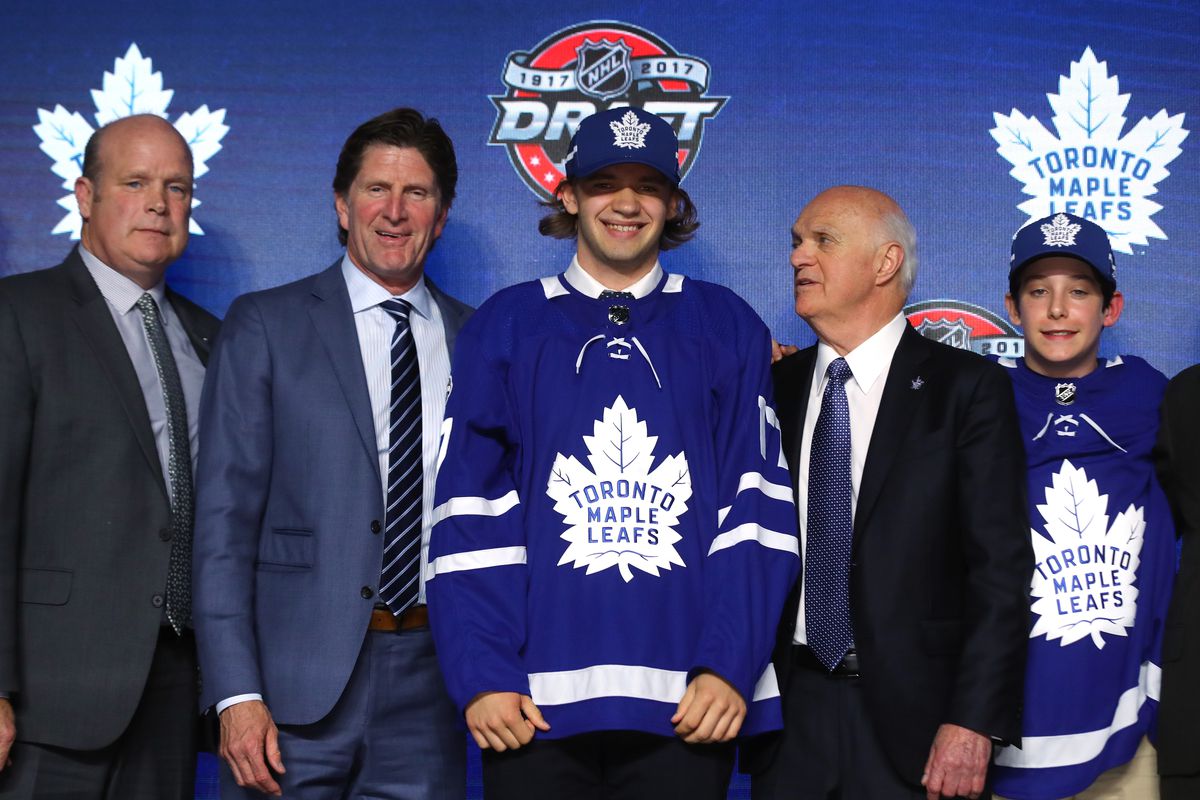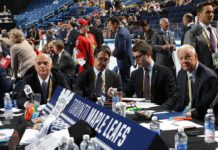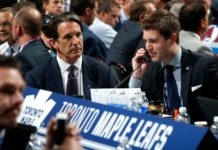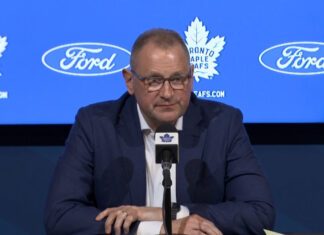Maple Leafs Director of Player Personnel Mark Hunter met with the media after the selection of defenceman Timothy Liljegren in the first round of the 2017 NHL Entry Draft.
Lou said yesterday that they were going to get the best player in the draft and not draft toward a particular position. Does that concur with what you guys were able to pick up here tonight?
Hunter: Yeah, we really liked Timothy. We believe in his skill. He was up and down this year, but he had a bad case of mono. He can move pucks. He is a new NHL kind of defenceman that can move up and down the ice at a high pace and make plays out of his own end very quickly.
Are you confident it was the mono that affected his year?
Hunter: Yeah, I’m confident. He played seniors — the men’s league — a bit, and then he got mono, and when he came back from there he wasn’t the same. It took some time to get him going. But, the year before… I always believe it’s a body of work. It’s three months. You can’t judge a player on three months. He wasn’t as good as he should be, but there are a lot of good things that he’s done. At the U18s, he was one of the better defencemen there. We’re impressed with him and very happy to have him. He’s something we need on our backend.
If somebody told you last summer that you could get him at #17, what would you have said?
Hunter: I would’ve been shocked. I wouldn’t have thought he’d be there at 17 after what he did the year before. He’s just high-end skill. He can skate. He’s got all the tools that you want as a hockey player. What he did the year before at [age] 17 was off the charts. He had maybe a little bit of an up-and-down [year] this season, but at times, he was very good, too.
He was at the U18 at North Dakota and I think he had a point a game and he was one of the best defencemen on the ice. He’s going to be enjoyable for the fans of Toronto to watch. He’ll bring people out of their seats.
Everybody says that in the draft. They say, “Oh, we got this guy that nobody else…” I don’t want to go on that cliché. I just know he’s a solid hockey player and he’s a puck-moving defenceman that [fits] the new age of the NHL that can put the puck up the ice quickly. It’s something we believe in. We believe in skill and we want skill on the backend. He’s one of those kind of guys.
Would you say that the mono was kind of the learning point for him?
Hunter: I just think it hurt his development to the rate that he needs to be at as a hockey player. It pushed him back a bit. That said, we’ve all had people we know have mono. It takes time. Now, he’s healthy and ready to go. He’s a good player.
What do you expect for his trajectory to the NHL? He said he had another year at least in the Swedish league.
Hunter: Yeah, that’s something we’ll talk about. I’m sure that he’ll come to our mini camp on the 7th [of July]. We’ll look at him and see where he’s at and go from there. When you’re making these decisions, it’s hard to tell right now where he’s going to play. He’s got to get ice time and he’s got to play. He’s got to move ahead with his career here and show your stuff.
What’s enabled Sweden to be a go-to country for the organization, it seems, in the past few years?
Hunter: They’re all solid individuals and they’ve got good character. They work at their game and they progress very well. You see in the draft there were a lot of Swedish kids that went today.
Was it close between him and the next guy on your list?
Hunter: He was ahead. That’s our list, and we drafted him.
What did you learn about him in your interviews with him?
Hunter: He’s very honest about his game. I think that’s important. Some young men think they’re good and they’re bad. I think he’s very humble and honest about where he wants to go. That’s important to be a hockey player.
Do you think he’ll be in North America next year or will you leave him in Sweden?
Hunter: Right now, we foresee leaving him in Sweden, but that’s why we want to wait until mini-camp and see where he’s at. We’ll make decisions then. I think he had too many teams that he was on last year. When that happens for a hockey player over a year, it’s a rollercoaster.
Do you think that will be rectified next year in a more stable situation?
Hunter: We hope so right now that we get him in a situation where he’s on a men’s team and is going to get a lot of ice time and be healthy and progress as a hockey player.
How was the first round in terms of where players were going? I heard it was going to be sort of chaotic, that somebody’s number five could be somebody else’s number 20.
Hunter: I thought the first 10 kind of went, and then the next 10 after that, it was kind of all over the map. That’s drafting. Everybody has a different opinion.
What do you expect tomorrow for yourselves?
Hunter: Hopefully we pick up some more players. We’ll pick up the best player there. We draft at 58, so we’ve got a chance to take another good player at that position.
A lot of GMs said it was tough to tell this year what other GMs were doing. Would that be fair to say?
Hunter: There were maybe a couple where teams reached a bit. But I thought in general, on our list anyway with our top 40, everyone was pretty much in that area. There weren’t many wild picks to us.
He said he was nervous when you met with you guys. Did you sense that?
Hunter: I think he was okay. Better than I expected. He speaks pretty good English. I thought he was just okay, but it was a certain way where I think he explained himself well but he’s kind of a quiet kid and a humble kid when he’s talking. I think, in time, he’ll open up.




































